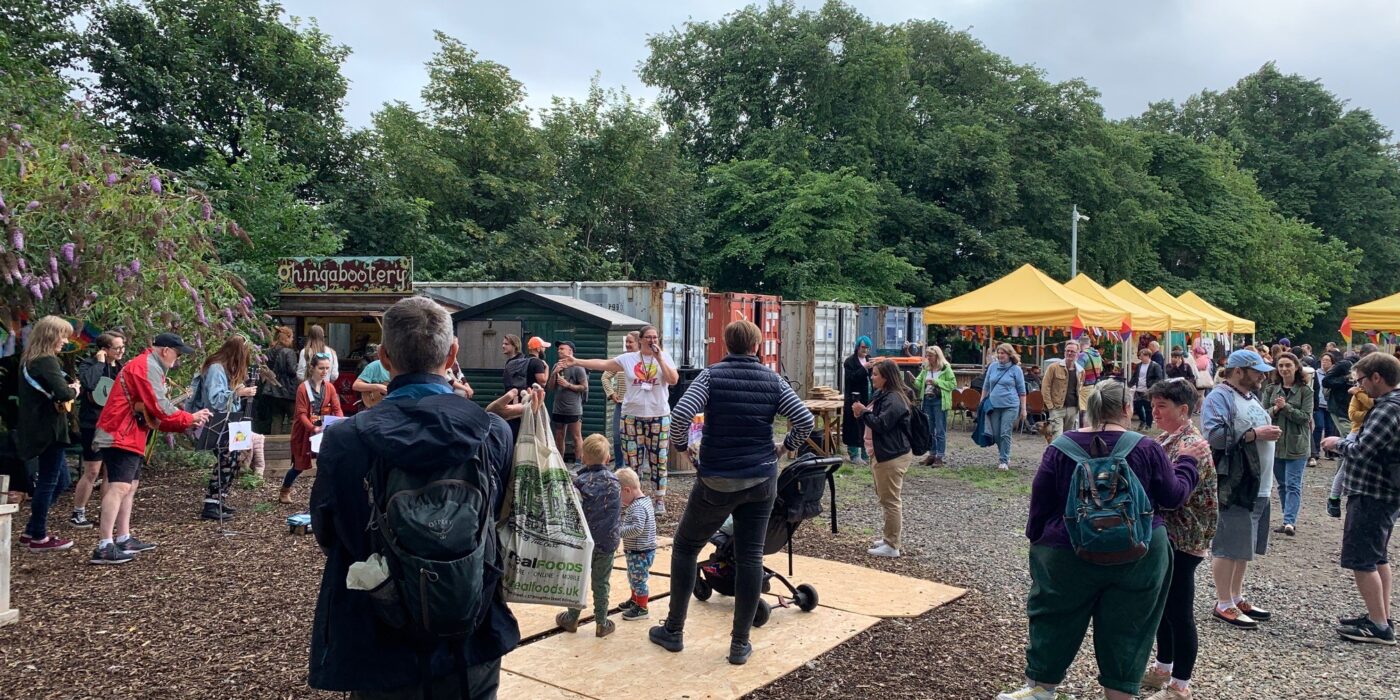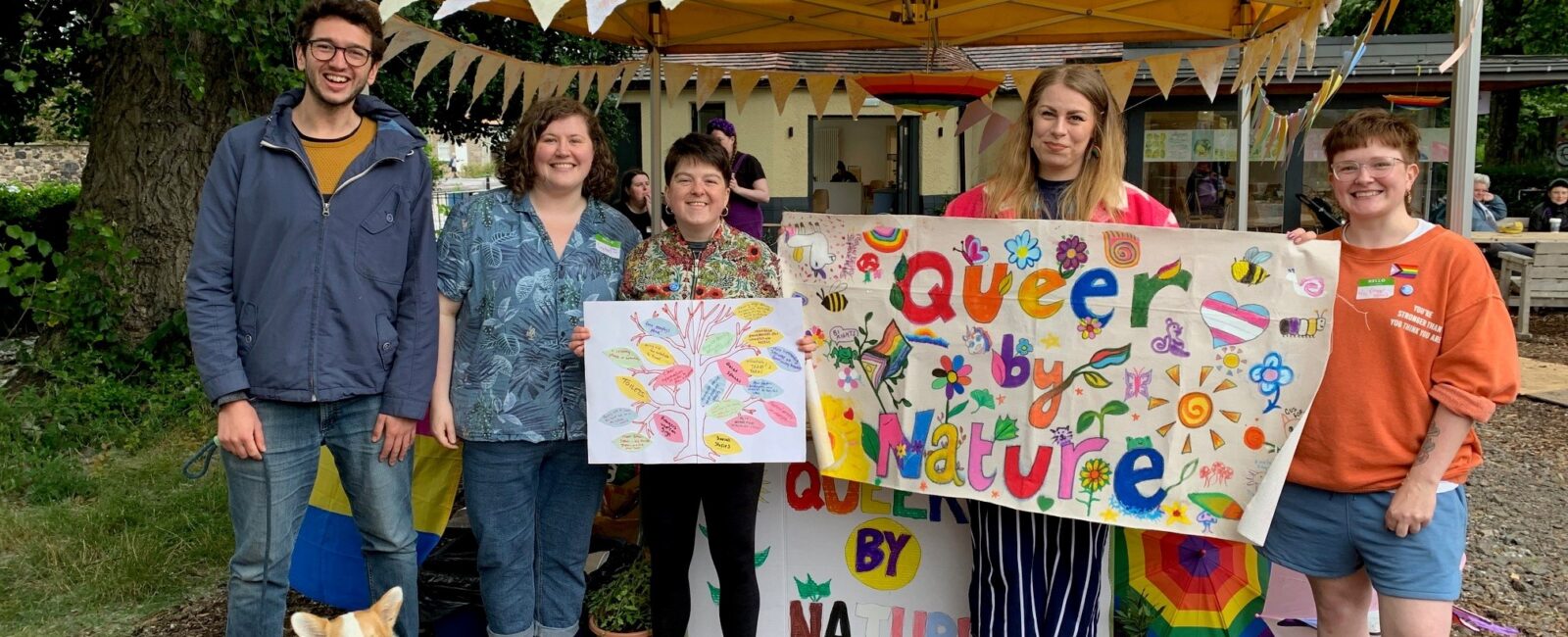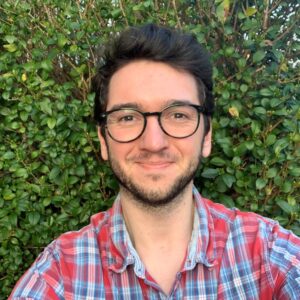As part of the Cumberland Lodge Fellowship, we offer a Personal Development Grant for Fellows to use creatively to promote more open and inclusive societies. Here, Cumberland Lodge Fellow 2021-23, Andrew Marks, reflects on the impact of using the grant to help connect LGBTQ+ people with nature in his local community.
Like so many other LGBTQ+ teens coming to terms with their gender and sexuality, I reasoned that the first step in my long-term strategy for a safe and happy life involved moving to a city.
Popular 2000s TV shows like Will & Grace and Queer Eye for the Straight Guy, alongside most LGBTQ+ culture of the time, communicated to a young and impressionable teenage me that to be LGBTQ+, especially a gay male, was to be an urban creature, whose primary interests were to be shaped around a highly consumerist lifestyle. Rural life and its monopoly on nature was a place of heterosexual masculinity – “Man’s Dominion” – and no place, I felt, for me.
And yet, as I grew older, my passion for wildlife, rural life and the outdoors only increased, and I struggled to reconcile a longing to be closer to nature alongside a sense of my LGBTQ+ identity.
This is not an unusual experience for many LGBTQ+ people, and it illustrates some of the politics and cultural norms that are present in the way that the environment and a broader “nature” are understood and experienced.
“Nature” is not simply biological, but includes one’s perceptions and relationships with the surrounding environment. How one sees “nature” is impacted by culture and identity, meaning that a person’s race, ability, gender, class, sexuality, nationality, to name a few, can often affect how we do or don’t see ourselves in relation to the natural world around us. Consequently, understanding how relationships with nature are affected by an aspect of one’s identity and/or culture, allows one to see more clearly some of the many generalisations that influence relationships with the environment for better or for worse – generalisations that take on great significance at a time of both climate and nature emergencies.

As I have encountered over my Masters and PhD research at the University of Edinburgh, there are in fact vast histories of LGBTQ+ individuals and communities who have played pivotal roles in environmental research and politics, as well as how LGBTQ+ people continue to be present and active parts of both urban and rural communities. However, for many LGBTQ+ people, a sense of legitimate belonging within ‘nature’ and the separate, but frequently conflated, challenges of urban/rural acceptance persist.
Over the course of my research, I have been repeatedly surprised and inspired by the many communities who are reconnecting and fostering relationships between LGBTQ+ people and nature. From LGBTQ+ urban food growing groups, to LGBTQ+ rural outdoor health and wellbeing activities, there is a vast network of people around the UK trying to bring LGBTQ+ people together to care for the environment and our non-human cohabitants.
Moved by my experiences researching with these communities, I considered applying for a Cumberland Lodge Fellowship Personal Development Grant, to try to bring some of this learning back to my own local community through organising a public engagement event that encourages LGBTQ+ people in Edinburgh to connect with their local greenspace, build community, and learn more about local wildlife and nature-based activities. I was delighted by the response from the Lodge, who were very supportive of my application and the idea, and I swiftly set about planning how to translate this into reality.
Understanding that I could not do this alone, I joined a small group of similarly motivated local individuals in starting a community group, Queer By Nature, and with enormous support from a local LGBTQ+ charity, LGBT Health and Wellbeing, we collectively set about co-creating a free, safe, accessible, sober and family-friendly day that would celebrate LGBTQ+ connection to nature. Taking place at the Leith-based community croft, Earth in Common, the event would be located at the centre of the largest greenspace in Leith, Leith Links. On 22 July 2023, after many meetings and last-minute preparations, it finally arrived.
The day itself was a blur of activity. All 300 free tickets had sold out before the event even began and even the local MP made an appearance! There were some 12 different stallholders present, including representatives from Edinburgh Council, as well as local businesses, LGBTQ+ and environmental charities, local community groups, and a free art exhibition from a local LGBTQ+ artist. Throughout the day, there was a raffle, free yoga sessions, free foraging sessions, nature walks, mindfulness sessions, a children’s craft area, a book-browsing area, music performances and by-donation food cooked by a Trinidadian and Tobagonian super-chef duo.
The financial support from Cumberland Lodge kindly paid for the arts materials for the children’s crafts area (popular with parents as well as their children!), as well as for two professional foraging walks for attendees, and bags of compost and seeds. The latter were available for people visiting our stall to learn how to plant and grow from seeds, as well as providing a living memento of the day.
Before we knew it, the day had ended. As we packed up our stalls and tidied the community croft, there was a shared sense of disbelief at what had just happened. What had seemed at first like a fringe idea had drawn in so much energy and excitement from the local community, with attendees asking ‘when is the next one?’ and ‘how can we keep in touch?’.
I’m not sure whether it was a heightened sense of anxiety about the global climate and biodiversity crises that encouraged people to attend the day, or perhaps there were many people who, like me, had been yearning for an inclusive and welcoming way to connect with others and with nature. What is certain is that the event touched a nerve for many – and the number of new people on the Queer By Nature mailing list reflects this!
Since then, I have been reflecting on the potential for similar events, and how to inform and link up with other community groups hoping to foster an inclusive and welcoming environment for people looking to connect with the natural environment. Equally, I have been incredibly grateful for the opportunity that the Cumberland Lodge Personal Development Grant provided to both catalyse and support this event.
This grant not only helped me to “enhance my skills and promote more peaceful, open and inclusive societies” (in my own back garden, as well!), but it provided a personally cathartic opportunity to translate observation and experience into action and community-building. The rewards of this experience, like so many others I have been lucky enough to have encountered through the generosity of Cumberland Lodge, will stay with me on both a practical and personal level for a long time to come, as, I hope, they will within my local community.


